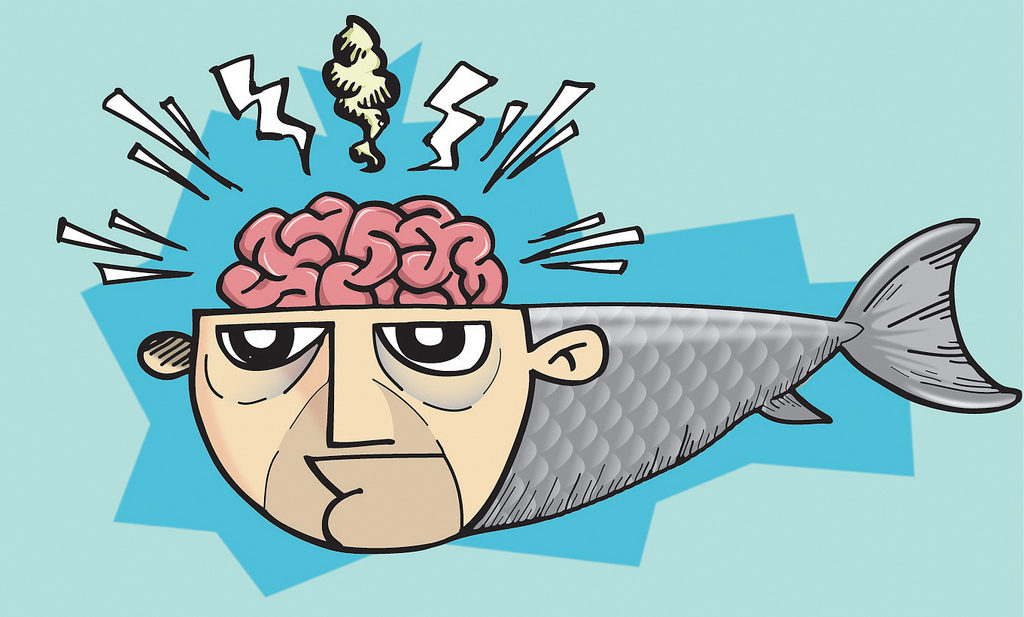There is a substantial body of evidence suggesting that not getting enough omega-3 fatty acids in your diet may be connected to a diverse array of psychiatric symptoms. In a new study published this month, psychiatrist Robert McNamara and Erik Messamore provide an overview of the evidence and call for screening of omega-3 deficiency in people experiencing symptoms associated with ADHD, depression, mood disorders, and psychosis.

Pointing to the “limited efficacy and adverse side-effects associated with conventional psychotropic medications,” the researchers stress the need to identify alternative treatment approaches. As a result, many experts are turning their attention to the role of nutrition in psychology and psychiatry and have identified omega-3 fatty acids as a potential culprit in particular symptoms.
Omega-3 fatty acids, including two types, eicosapentaenoic acid (EPA) and docosahexaenoic acid (DHA), are associated with the development of new brain cells (neurogenesis) and are typically attained through consumption of cold water fish as well as fish oil derived supplements.
“Over the past three decades, a substantial body of evidence has implicated a dietary deficiency in long-chain omega-3 (LCn-3) fatty acids… in the pathophysiology of different recurrent psychiatric disorders, including major depressive disorder (MDD), bipolar disorder, schizophrenia, and attention deficit hyperactivity disorder (ADHD),” they write.
“While this body of evidence has been slow to impact conventional psychiatric training and practice, the field is slowing evolving, and nutritional medicine is gaining credibility.”
The researchers summarize studies suggesting that omega-3 deficiency, especially in the periods right before and after birth, may be a risk factor for the development of psychological symptoms. They analyze evidence finding that patients diagnosed with mood, psychotic and attentional disorders have significantly lower blood levels of both EPA and DHA, and also present findings indicating the successful reduction of symptoms through fish oil supplementation.
Building on these results, the researchers suggest that enough evidence currently exists to recommend routine screening for omega-3 deficiency in patients presenting with psychiatric symptoms.
*
Messamore, E., & McNamara, R. K. (2016). Detection and treatment of omega-3 fatty acid deficiency in psychiatric practice: Rationale and implementation. Lipids in Health and Disease, 15(1), 1. (Full Text)















My psychiatrist did recommend I take fish oil, as he was weaning me from the drugs, so the benefits of fish oil have been known since at least 2005, in the psychiatric circles. Wouldn’t it be great if our country was recommending routine screenings for omega-3 deficiency in pregnant woman, rather than routine screenings for a supposed need for antidepressants or antipsychotics?
Alas, the pharmaceutical industry can’t patent fish oil, since God theoretically invented it, not them. And it does seem the corporations want to destroy everything God created, so they may patent their drugs, seeds, hybrids, whatever. But what if, God created a world filled with things meant to actually help and heal humanity, and the multinational corporations only want to create patentable products meant to harm humanity, for profit?
I do know many don’t believe, thus discussions of God, are quite taboo, forgive me. But a quick question, does order come from chaos, or is order created by a designer, in the material world? As a kitchen bath designer, who dealt with a fair number of clients who wished they’d come to a designer initially, I can tell you order is created by a designer in the material world, and a perfect order does not come from chaos, or from a lack of a designer.
And this world does have staggering natural beauty, order, and cures. It’s possible, disrespect for a theoretical intelligent designer, may be unwise, and belief in such should no longer be a rational for the psychiatric drugging of a person any longer, especially since such is, I believe, still technically, illegal in the US.”
Report comment
I disagree. If this stuff worked, Big Pharma would be all over it with salmon oil reuptake inhibitors or some such. I really don’t know why some of us rail against the medical model but then embrace orthomolecular approaches.
Report comment
Thank you for covering research that shows the importance of nutrition for brain function. It is certainly possible that recent increases in mental illness are due to people in the developed world eating so little fish. Our ancestors most certainly ate more of this very nutritious food and suffered less mental illness despite the fact that their lives were also very stressful.
Report comment
Because the medical model in psychiatry MIA rails about isn’t but a charade of medicine. Behavioral diagnosis went out of general medicine as the microscope went in, but remains big-time in psychiatry, enshrined in the successive DSM’s. The idea of mental illnesses actually being mental syndromes with many potential causes is alien to orthodox shrinks, but not to orthomolecular guys, who will actually take the time to try and find out what physical processes are going on, perpetuating your misery. Drugs aren’t the mainstay of orthomolecular treatments; the idea is to restore your functioning, not to leave you a dazed and confused inhabitant of the Twilight Zone.
Report comment
Yes, I understand what orthomolecular psychiatry is; in fact, I talked to Abram Hoffer in the 1980s. But my question is why do some people maintain that mental disorders are strictly in the mind, as opposed to the body, while deciding to alter their bodies rather than their minds. For the record, I agree that mental disorders are just that: mental. Consequently, that’s where I feel we should search for solutions. It shouldn’t come as a surprise that a healthy diet helps make a healthy person.
Report comment
Had you chatted longer with Abram Hoffer, you’d have found he believed mental disorders are of bodily origin- did he tell you about mental effects arising from fluctuations in your blood sugar or trace metal deficiencies or heavy metal excesses?
Report comment
Yes, I know all about Abram Hoffer’s beliefs about the causes/cures of schizophrenia and I reject all of them. I don’t recall him talking about blood sugar but he was certainly clear about the role of mega-vitamins. Thomas Szasz called Hoffer a quack and I entirely agree.
Report comment